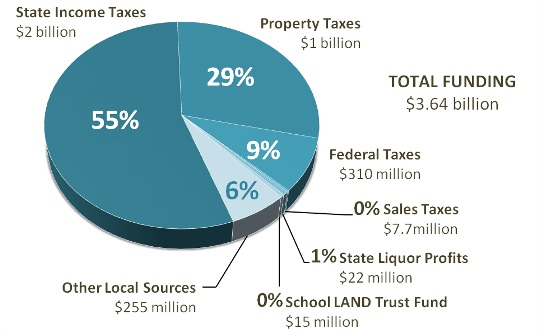A Cruel Joke
Parents for Choice in Education‘s Charter School funding bill, HB 313, sponsored by Merlynn Newbold, passed out of the House Education Committee this morning by a narrow margin. So score one for the resurrected Parents for Choice in Education (PCE) and their KSL.com hire, über-lobbyist Chris Bleak, tasked with getting vouchers passed this session, come hell or high water. It’s not for nothing that he’s been running a full time shop at the Capitol for the last four months running.
But the path to this morning’s rigged vote on the bill actually started more than four months ago. More like 14 months ago, when PCE, tactically and conceptually trashed from its 2007 voucher campaign, decided it needed a facelift to make another run at vouchers. The Utah Association of Public Charter Schools (UAPCS) was selected as the ideal victim vehicle, but first there was the inconvenient matter of its director, Steve Winitzky, being a wee bit hostile to PCE. Suddenly, late in 2009, two vacancies appeared on the UAPCS board when two board members resigned for unrelated reasons. PCE saw its opening and pounced.
With the assistance of UAPCS Board Chair, Mark Cluff (who for unexplained reasons was somehow functioning as Board chair in spite of not having the votes from a school to validate his chairmanship), and the completely conflicted Board member Lincoln Fillmore (Lincoln’s business is charter school consulting), the stage was set. Lincoln and Mark were both also board members at PCE, and all they needed was two more PCE bodies to get a board majority (four seats out of seven), and Winitzky would be history.
I’ve already explained here how PCE ice queen Robyn Bagley and PCE drone Jed Stevenson, swiftly moved into the vacant slots and so I won’t rehash that history now. But I mention it because it’s important to remember that ever since Winitzky was shoved down the gangplank, with most of the rest of the staff following in short and not so short order, UAPCS became an empty shell ripe for looting; a host really, for the PCE parasite within. When legislators hear Chris Bleak introduce himself as the Executive Director of the Utah Association of Public Charter Schools, they should keep this in mind.
PCE cowardice and an IRS question
By now the UAPCS is an Association in name only. There is virtually no staff aside from Lobbyist Chris Bleak and Accidental Lobbyist Kim Frank. Former PCE Office Manager and Tenth Amendment fundraiser Allison Holmes, is coordinating the group’s annual conference in June. Many charter schools who were former members of the association have simply elected not to pay dues.
Bagley is actually not on the UAPCS board any more, and neither is Stevenson, but at this point, that’s irrelevant. Delaina Tonks, from Bagley’s online charter school, Open High School, can take marching orders. And really, once Winitzky had been eliminated, the heavy lifting was done.
For sure, the UAPCS has offered no services at all to its members since June of 2010, unless you count lobbying as a service. Some say that lobbying is the only thing many of these schools cared about anyway, and you might say that this is their prerogative, except for 2 inconvenient truths:
- Part of the money that is being used for PCE/UAPCS lobbying came from a grant from the Daniels Foundation that was meant for the association to provide services to charter schools in the interest of improving charter school quality. It was never meant for lobbying. Not only a violation as far as Daniels is concerned, but also probably, the IRS.
- Part of the money being used for PCE/UAPCS lobbying is public money. For a number of years Utah’s charter schools have managed to siphon off 25% of per-pupil funding from the school districts (obtained through property taxes), to themselves, despite a state legislative audit that says that many of the schools are miserably run – no idea whatsoever about how to comply with state reporting requirements – and they have virtually no oversight. There is a team of 5 at the State Office of Education to oversee 78 charter schools, with more in the pipeline. Some argue that the money being used can be characterized not as public money but money from the private fundraising the charter schools must do to cover their funds shortage. But this is unconvincing. Without public funding to begin with, the school would not exist, and therefore there would be no fundraising. It’s a shell game.
The mortal assault on public education
 Newbold’s bill works like this. Starting this year, instead of taking only 25% of the “local replacement” per pupil funding (funneled to the districts through property taxes), kindergartners who leave the regular school system to go to charter schools will take 100% of their district funding with them. The rest of the students (grades 1-12) who leave for charter schools will only continue to siphon off 25%. In 2012, kindergartners and first graders will take 100% of the funding, with the rest still at 25%. In 2013, kindergartners, first and second graders will siphon off 100% until 13 years from now (and if you believe they’re really going to move that slowly, they also have some swampland to sell you), charter school students from kindergarten through 12th grade will be robbing 100% of the per pupil funding from the districts. When your local school can’t keep the lights on any longer, don’t say we didn’t tell you so. Maybe the local schools can be turned into homeless shelters or jails?
Newbold’s bill works like this. Starting this year, instead of taking only 25% of the “local replacement” per pupil funding (funneled to the districts through property taxes), kindergartners who leave the regular school system to go to charter schools will take 100% of their district funding with them. The rest of the students (grades 1-12) who leave for charter schools will only continue to siphon off 25%. In 2012, kindergartners and first graders will take 100% of the funding, with the rest still at 25%. In 2013, kindergartners, first and second graders will siphon off 100% until 13 years from now (and if you believe they’re really going to move that slowly, they also have some swampland to sell you), charter school students from kindergarten through 12th grade will be robbing 100% of the per pupil funding from the districts. When your local school can’t keep the lights on any longer, don’t say we didn’t tell you so. Maybe the local schools can be turned into homeless shelters or jails?
You could look at it like this. Grover Norquist famously talked about shrinking the government to the size that it could be drowned in the bathtub. In this case, all the water will be drained from the bathtub first, making it difficult to drown the school districts, but if the climate is bad enough they can just catch pneumonia and die. Would Grover approve of raising taxes to do it? Because that’s what PCE has planned.
The Magic Money Tree
 This brings us to the craziest thing about Newbold’s two bills, which she insists are not related. Sure they aren’t. Newbold told the education committee this morning that if the money were to follow the student, the school districts would benefit because they would have less students to educate. So here are a couple of questions for Newbold. When her six children began to leave home, did the bank reduce her mortgage? Did the roofer give discounts accordingly? Did the lawn grow a little slower, need a little less water? Did the heat bill go down every time a child left? Why would school districts be immune to the same economic laws that govern everyone else? But more importantly, when Newbold paid into Utah’s public education system through her property taxes, did she pay six times, because she had six children? Or did she pay the same as her neighbor who only had one?
This brings us to the craziest thing about Newbold’s two bills, which she insists are not related. Sure they aren’t. Newbold told the education committee this morning that if the money were to follow the student, the school districts would benefit because they would have less students to educate. So here are a couple of questions for Newbold. When her six children began to leave home, did the bank reduce her mortgage? Did the roofer give discounts accordingly? Did the lawn grow a little slower, need a little less water? Did the heat bill go down every time a child left? Why would school districts be immune to the same economic laws that govern everyone else? But more importantly, when Newbold paid into Utah’s public education system through her property taxes, did she pay six times, because she had six children? Or did she pay the same as her neighbor who only had one?
Utah’s per-pupil spending, to our everlasting shame, is the lowest in the nation, at around $6,000. It is a complicated pie, and you can check out how tax revenues are assigned to schools through this handy chart produced by the Utah Taxpayer Association.
 Now let’s do some simple math. Let’s say Newbold’s property taxes were $1000 a year while her children were school-age. Let’s say her one-child neighbor lived in a similar house on a similar piece of land, and her taxes were also $1000 a year. Should Newbold have been allowed to withdraw $60,000 while her neighbor withdrew only $6,000? PCE seems to think so.
Now let’s do some simple math. Let’s say Newbold’s property taxes were $1000 a year while her children were school-age. Let’s say her one-child neighbor lived in a similar house on a similar piece of land, and her taxes were also $1000 a year. Should Newbold have been allowed to withdraw $60,000 while her neighbor withdrew only $6,000? PCE seems to think so.
At this rate, the biggest economic growth opportunity in Utah in the coming years will be in home schools set up as “charter schools”. Think of the income possibilities.
And if the tax money tree starts to look a little bare? Newbold has a fix for that as well. In her Not-A-Companion-Bill, H.B. 301. H.B. 301 suspends the truth-in-taxation hearings for a year so that when the school districts are obliged to raise taxes to cover the shortfall they are now being forced to turn over to the unaccountable charter schools, it can be neatly done without having to bother with annoying public participation.
The obvious plan here is to make school districts into the tax raising bogeyman, while everyone forgets that it was PCE and its charter allies who set the whole thing up.
Better than vouchers
 It’s better than vouchers if you think about it. Vouchers were only going to bestow a totally unfundable rebate of $700 per child. Robbing the system of something close to $6,000 per pupil will drain the bathtub quite a bit faster. PCE is evidently tired of waiting around.
It’s better than vouchers if you think about it. Vouchers were only going to bestow a totally unfundable rebate of $700 per child. Robbing the system of something close to $6,000 per pupil will drain the bathtub quite a bit faster. PCE is evidently tired of waiting around.
In my next post I will introduce you to some of the people in the PCE/UAPCS braintrust and talk a little more about the democracy that PCE fears so much. Even though this bill has been in the works for over a year, it didn’t surface until late last week, 9 days before the end of the 2011 session, with public comment so severely restricted as to be essentially meaningless. There was a reason for that.



Posted by Pat Rusk on March 3, 2011 at 4:25 pm
Thank heavens someone is finally exposing these people. They are despicable!
Posted by Laura Black on March 3, 2011 at 5:11 pm
When will the public finally wake up to the destruction these anti public education people are causing? They are a bunch of elitists who don’t want their kids to go to school with YOUR kids.
Posted by Jennifer Boehme on March 3, 2011 at 6:03 pm
Charter schools are ruining communities and fracturing neighborhoods. We need to stop HB 301 and HB 313 now. The long-term effects are too harmful to neighborhood public schools.
Posted by Karen Smith on March 3, 2011 at 7:31 pm
Is there any way to get this information on the news? This year’s legislature seems to be doing more and more of this type anti-education legislation and people are not aware.
Posted by Concerned Citizen on March 3, 2011 at 8:23 pm
There are some good reporters up there but there are far too few of them and they are spread too thin. It was hard for me to write about this any earlier than this because the legislation was being concealed. Deliberately, as we see. This is the most shameful thing about what PCE/UAPCS is doing. If they believe their cause is just, why the need for such secrecy and stealth and censorship of public comment? That right there tells you there is something awry.
In the meantime the best thing you can do is share this information with all your friends and family and urge them to share it with theirs and start focusing your attention on their legislators and the governor’s office so that they start feeling the heat, especially about this damaged process.
I did hear that the UVU Revolutionary Students Union is having a rally tonight at the Capitol at 6 p.m. to protest cuts to education – although they are naturally more focused on the effects for higher education.
Posted by Marlene Irons on March 4, 2011 at 5:23 pm
I hope this will open the eyes of the 98% of the parents that have trust in the Public School System and send their children there will take a look at their legislators and oust those that are not doing what is best for ALL of the public school children in Utah.
Posted by Ellen Walker on March 4, 2011 at 7:41 pm
You’ve overlooked another ‘companion’ bill: SB65, which will require local high schools to spend $900+ each time one of their students signs up for online classes. Right now, all Utah students can take as many online high school classes as they need without penalizing their local school, but in order to save about seven cents per person per year (that’s based on the 2010 population of Utah, and the bill’s fiscal note), SB65 will take MORE money away from local high schools, and limit student access to online classes to boot.
Posted by Ellen Walker on March 4, 2011 at 7:42 pm
…and I forgot to mention that under SB65, that $900 per student per class can be sent out of state to for-profit online schools, outsourcing Utah teaching jobs and hitting the local economy.
Posted by Concerned Citizen on March 4, 2011 at 7:46 pm
Dear Ellen,
Thanks. I’ve been contacted by another reader about this and am looking into it. I welcome any additional information that readers would like to send me privately, through utahgravytrain (at) gmail (dot) com
CC
Posted by Judy Darby on March 5, 2011 at 11:25 pm
You need to go on talk radio, and could even get some volunteers to go door to door with a petition to get signed against it and put it up for vote again to the public…Common sense tells you money for charter schools takes away from regular neighborhood schools
Posted by Judy Darby on March 6, 2011 at 1:31 am
you need to put this on facebook
Posted by Darren Beck on March 10, 2011 at 11:13 am
Guys, you over simplify some things tragically, but you do hit some key issues. I was a previous board member of UAPCS (nearly 4 years) and then a staff member for one of the worst years of my professional life out of 47 on this planet. Many of us who have helped build charters from the ground up are NOT doing it so our kids don’t have to go to school with your kids, whatever the hell that even means. We want a variety of things, but segregation is not one of them for me. Please remember, all charters are not the same, nor are the genuine folks desiring to innovate and create communities of learning for the 7% of public students attending a charter school. Most of us want good relationships with genuine educators who are about the kids. But a 19th century concept of education is not the right system for 21st century students. I get this is an anti-charter blog at some level, but I’d appreciate it if a few facts were checked all the same.
Posted by Concerned Citizen on March 10, 2011 at 12:05 pm
Dear Darren,
This is not really an anti-charter blog although I can see how people would get that impression. When it comes to charters in Utah I am more concerned with PCE’s complete lack of ethics and disgusting tactics, which taken to their logical conclusion will take down all public education, charter schools and traditional schools alike. That’s their goal – that, and lining their pockets in the process. I’m pretty sure you’d agree.
Despite my personal belief that the charter concept is flawed, I am fully aware that there are exceptions, and I’ve been thinking about writing more about this after the session. I do wonder why the genuine folks looking for innovation/communities of learning cannot achieve this through magnet schools within the traditional system. I don’t see how replacing the current system with a web of “competitive” schools ever achieves the same economies of scale offered by a unified state system. Also, I wish we could talk honestly about the fact that no school is a magic castle, completely divorced from the socio-political problems surrounding it. If we want to talk about oversimplification, let’s start with teacher scapegoating as a substitute for the real political discussion we ought to be having.
Posted by Seventy on November 11, 2012 at 2:13 am
Darren,
Charter schools a 21st century education? I think not. Back to basic math algorithms will not make our students 21st century students. Kids really DO need to know the why behind the math, and how to think like a problem solver. Many charter schools want to teach 20th century math–not good enough. Rote learning is not learning. Take your kids to a public school for progressive thinking and 21st century math.
Posted by Gary Nelson on November 15, 2014 at 11:29 pm
Dear CC,
Please show me all the magnet schools that the districts have created. Please show me the innovative practices of school districts when not forced to compete with charter schools. Please help me understand how a student centered approach to education is inferior to the industrial, assembly line approach the districts take. Please enlighten me on how a focus on teaching to the mean is really good for individual students.
I agree that some charters are elitist and may not serve the needs of our most disadvantaged students. Some charters perform poorly and should be closed. However, without an alternative many parents are forced to send their students to dismal, awful places.
Posted by Concerned Citizen on November 16, 2014 at 1:42 am
Dear Gary,
Thank you for your interest. You pose some interesting questions. But rather than getting bogged down in straw man arguments, lets consider things from a completely different angle. I assume you understand the concept of economies of scale. The main problem with redirecting public education toward a charter system is that it completely destroys the economies of scale that are achieved through a comprehensive education system. Speaking of the “most disadvantaged,” where are the school psychologists and nurses and speech therapists at the charters? Oh wait, I forgot, they don’t exist because you need a large public system to fund that kind of umbrella.
The fracturing of this umbrella leads to the same dead-end: a galaxy of practically unregulated charters – some good and some abysmal – and a public education system that is so bankrupt, it can’t keep the lights on. (Don’t take my word for it. Google “public school repurposing” to see Utah’s future, in the form of Chicago, Atlanta, Kansas City and Philadelphia.)
Of course this is exactly what a good portion of those involved in the charter movement want – since they are ideologically opposed to regulation in general and public education specifically. The next stop on the ideological train is Chile, where private education is the rule rather than the exception. I recommend a gas mask to weather the public protests.
CC